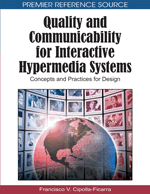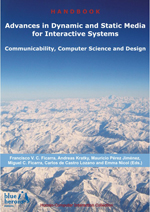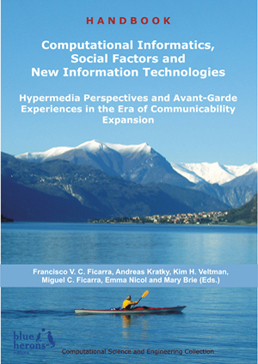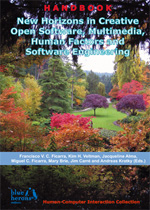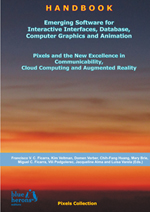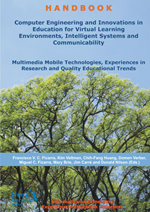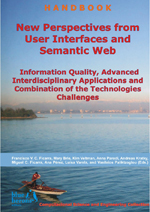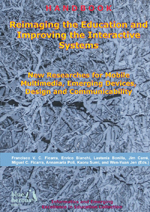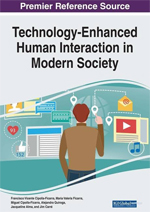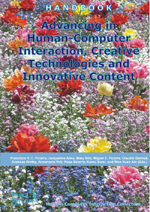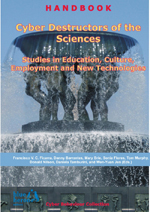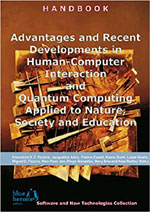* * * Editing * * * Handbook * * * Editing * * *
Cyber Behaviour Collection
Title: "Finding a Balance Between Human Privacy Rights, Web Security and Openness: Techniques and Methods from Social Sciences, Software and Artificial Intelligence"
Handbook Aims
The complexity of the computer-legal-social situation leads to serious damage to human nature at the service of human needs, especially when there are mergers, convergences, etc. of the various areas of knowledge from the theoretical-practical perspective. In the new millennium, some of them turn out to be totally illogical or unbalanced, as has been seen in broad sectors of ICT, HCI, STEAM, Woman's Studies, etc., and which are related to education, research, and so on.
In the immediate future and with the spread of artificial intelligence, one of the greatest challenges in the evolution of the Internet and interactive systems will be to find the right balance between safeguarding people's privacy rights, at the time of greatest vulnerability. That is, when they are using any interactive system or device connected to the network. The rise of cybercrime through dynamic persuaders, incarnate narcissists, radical bipolar, and so forth have a high cost for those affected. The consequences can be measured in significant economic, physical, moral losses, etc. by diminishing credibility and reputation.
In other words, given the current prevailing confusion due to the technological revolution and perennial criminal behaviors, and cyberattacks that are growing disproportionately, it is necessary to reorganize the studies. The epistemological bases of the various disciplines related to the security and privacy of information and communication must be reoriented and rebalanced, with a 360-degree vision. To this end, the following areas of interest for this project are listed. This does not mean that other directly or indirectly related main or secondary topics can be included in the following list:
- Access Control and Privacy Protection
- Advanced Multimodal Interfaces for Security
- Artificial Intelligence for Cyber Security
- Assessment of Cyber Attacks Consequences with Formal and Factual Sciences Methods
- Authentication Mechanisms and Systems
- Behaviour and Profile of Dynamic Persuasors
- Biometrics Techniques
- Bipolar Disorder and Psychiatry Test
- Cloud Computing Security Risks
- Cross-Cultural Communicability, Design and Security for Children and Aged Population
- Cryptology, Cryptographic Protocols and Networking Security
- Cyber Destructors for Knowledge Transfer (University, Industry and Banking Foundations)
- Data Management, Privacy and Security
- Digital Contents and Copyright Protection Techniques
- Digital Democracy and Hacking Democracy
- Evaluation of the Impact of Security Efficiency on User Satisfaction
- Eye Tracking for Monitoring
- Fact Checking and Dynamic Persuasors in New Media
- HCI, User Experience and Information Privacy
- Heuristic Assessment for Cyber Attacks
- Human and Social Factors in Security and Privacy
- Hypocritical Use of Code of Ethics, Confidential Information and Privacy Protection
- Identity Theft Protection and Profession Cloning Detection
- Information Society and International Legislation for New Technologies
- Intelligent Systems and Security Services
- Interactive Design for User Security and Privacy Information
- Interfaces Models and the Interaction with Security Systems
- International Defense of Intellectual Property and Copyright
- Intrusion Detection and Fraud Detection
- Language-Based Security
- Machine Learning Approaches in Cybercrime
- Metrics for Cyber Destructors and Cyber Attacks
- Mobile Robots for Security and Surveillance
- Natural Interfaces, Communicability and Strong Security for Interactive Systems
- Networking Security and Intelligent Systems
- Ontology for Private and Confidential Information Management
- Parochialism and Cyber Criminals / Terrorists
- Privacy and Security in Context-Aware Multimedia Mobile Services Development
- Psychiatric Disorders into Parochialism
- Scientific Reputation and Public Opinion in Virtual Communities: Methodologies for Virtual Defense
- Security Polices, Models, Applications and Services
- Semantic Computing and Security
- Social and Human Factors in Private and Confidential Information Manipulation
- Social Networking and Confidential Multimedia Information
- Social Psychology and Human Behaviour in Safety, Security and Privacy
- Strategies of the Cyber Destructors
- Techniques of Verification of Scientific Information
- Theory and Applications of Cryptology
- Typology of Destructive Behaviour (Bullying, Stalking, Sadism, Racism, etc.)
- Universal Access to Information and Knowledge: Rights and Obligations
- User Behaviour in Networking Security for Industrial / Educational / Commercial Sabotage
- Veracity, Credibility and Reputation Management
- Violation of Epistemology of Sciences for Attacks from Universities and R&D Sector
- Virtual Classrom and Online Security
- Vulnerability Analysis
- Web 5.0 / 6.0 / 7.0: Safety, Security and Privacy
Submissions:
Two-stage submission: First, interested researchers and practitioners are invited to submit a chapter proposal clearly stating your focused domain problems and contributions related to one of the above topics due on * Closed *; second, authors of accepted proposals will be notified by "Closed" about the status of their proposals and sent chapter organizational guidelines. Full chapters are due by * Closed *. All submitted chapters will be reviewed on a triple-blind review basis. The handbook is scheduled to be published in 2024 by Blue Herons Editions (Canada, Argentina, Spain and Italy).
Editorial Advisory Board and List of Reviewers
:: Alan Radley. University of London (UK)
:: Alejandra Quiroga. University of Sydney (Australia)
:: Alejandro Frangi. University of Sheffield (UK)
:: Anna Parodi. University of Genoa (Italy)
:: Annamaria Poli. University of Milano Bicocca (Italy)
:: Amanda Rivera. University of Puerto Rico (Puerto Rico)
:: Bruno Cernuschi Frías. University of Buenos Aires (Argentina)
:: Chia-Wen Tsai. Ming Chuan University (Taiwan)
:: Carlos García Garino. National University of Cuyo (Argentina)
:: Claudio Germak. Polytechnic University of Turin (Italy)
:: Daniela Tamburini. Sperimenta Centro Studi Cinema e Formazione di Milano (Italy)
:: Derrick de Kerchove. University of Toronto (Canada)
:: Diego González. IMM - National Research Council (Italy)
:: Edgard Rebouças. Federal University of Pernambuco (Brazil)
:: Eulogia Mendoza. National University of La Pampa (Argentina)
:: Farshad Fotauhi. Wayne State University (USA)
:: Franco Casali. University of Bologna (Italy)
:: Gavriel Salvendy. Purdue University (USA) and Tsinghua University (China)
:: Georgios Styliaras. University of Ioannina (Greece)
:: Gloria Quispe. National University of Jujuy (Argentina)
:: Hugo Scolnik. University of Buenos Aires (Argentina)
:: Jaap van Till. HAN University of Applied Sciences (the Netherlands)
:: Jonathan Miller. University of Virginia (USA)
:: José Hamkalo. University of Buenos Aires (Argentina)
:: Juan Silva Salmerón. University of Ottawa (Canada)
:: Jurek Kirakowski. University College Cork (Ireland)
:: Kaoru Sumi. Future University Hakodate (Japan)
:: Klementina Možina. University of Ljubljana (Slovenia)
:: Koen van Turnhout. Hogeschool van Arnhem (The Netherlands)
:: Laura Gaytán. University of Colima (Mexico)
:: Lastenia Bonilla. University of Costa Rica (Costa Rica)
:: Ljubica Marjanoviè Umek. University of Ljubljana (Slovenia)
:: Lorenzo García Aretio. National University of Distance Education (Spain)
:: Marc Dubois. Free University of Brussels (Belgium)
:: María Laura Carranza. University of Molise (Italy)
:: María Teresa Dalmasso. National University of Córdoba (Argentina)
:: Marilú Lebrón Vázquez. University of Puerto Rico (Puerto Rico)
:: Miguel Cipolla Ficarra. Alaipo & Ainci (Italy & Spain)
:: Mohamed Hamada. University of Aizu (Japan)
:: Onur Demirors. Middle East Technical University (Turkey)
:: Özkan Kiliç. Middle East Technical University (Turkey)
:: Pablo Godoy. National University of Cuyo (Argentina)
:: Pablo Marrero Negrón. University of Puerto Rico (Puerto Rico)
:: Peter Stanchev. Kettering University (USA)
:: Philip Bonanno. University of Malta (Malta)
:: Pivovarova Liudmila. Moscow State University (Russia)
:: Reiko Hishiyama. Waseda University (Japan)
:: Ruly Darmawan. Institute of Technology Bandung (Indonesia)
:: Sergio Garrido. Nebrija University (Spain)
:: Sergio Salinas. National University of Cuyo (Argentina)
:: Silvia Poncio. Interamerican Open University (Argentina)
:: Tetsuo Tamai. University of Tokio (Japan)
:: Timothy Read. National University of Distance Education (Spain)
:: Tom Murphy. University College Dublin (Ireland)
:: Urška Fekonja Peklaj. University of Ljubljana (Slovenia)
:: Veysi Isler. Middle East Technical University (Turkey)
:: Vigneswara Ilavarasan. Indian Institute of Management Rohtak (India)
:: Wen-Yuan Jen. National United University (Taiwan)
:: William Grosky. University of Michigan-Dearborn (USA)
:: William Hudson. The Open University (UK)
:: Yeonseung Ryu. Myongji University (South Korea)
Chapter proposal guidelines:
The proposal is expected to be 2 - 4 pages, submitted in .doc or .pdf format, composed of title, author(s) (name, affiliation, phone number, and e-mail address), extended abstract (background, related work, principal contributions, references and so on), table of contents, and contact author/s. All enquiries and submissions can be forwarded to handbook@blueherons.net
Additional Notes:
1) Short Chapter: The longest extension of the text varies between 12 and 16 pages ('5,000 - 6,000 words). Long Chapter: The longest extension of the text varies between 24 and 30 pages (8,000 - 15,000 words). Exceptionally, the extension may be longer than this, but each additional page has a 25 euros cost (maximun 4 pages).
2) The chapters that have been positively evaluated by the reviewers (at least three), whose remarks or corrections –in the case there were, having been made by the authors, could be published in the handbook. The publication cost is 375 euros (short chapter) and 395 euros (long chapter), and the payment should be made through a bank transfer to the Blue Herons account, as it is next detailed:
|
 |
The payment of the transfer has to be made prior to December 21th, 2024 for the publication of the chapter. Send us a scanned copy of your bank transfer by email: handbook@blueherons.net Please ensure that you pay any charges you bank may charge. We will send you confirmation by email when we have received your payment.
3) All cancellations received in writing by December 27, 2024 will be fully refunded, less 45 euros which will be deducted for administrative expenses. No refunds will be made from December 28, 2024 onwards.
4) The author or authors will get only one a free copy of the handbook. The costs of certificated post and by airmail are at the expense of the author(s).
5) The author(s) can request more than a copy (until finishing the first edition) with a 40% special discount.
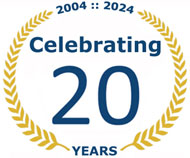
Welcome to Blue Herons Editions!
The origin of this publishing project is to be found in the Canadian lands, where nature presents itself generous in many places of its wide geography. More ...
Education, Human & Social Factors, Computer Science, IT, Design, Communicability, HCI, Computer Graphics, Computer Animation, and Mixed Reality:
We focus on education, research and new technologies with 44 years long experience. More ...
Literature and Journalism:
Intersection between universal literature, local new journalism (true stories), sociology and legal immunity. Two collections:
- Casoncelli Bergamaschi
It is a typical bergamasque dough filled with meat, similar to the raviolis. More ...
- Menjar Blanc & Black
It is a typical sweet of the Catalan coast and the Balearic Islands. More ...
Others Releases:
See all others new releases in books, CD, DVD, etc. More ...

Call for Papers, Short Papers, Posters, Demos, Research-in-Progress, Workshops, Doctoral Consortium, Hardware & Software Companies - Didactic Demos Sessions ...
ADNTIIC 2024 :: HCITOCH 2024 :: SETECEC 2024 :: HIASCIT 2024 :: CCGIDIS 2024 :: IPCTIIC 2024 | HCITISI 2024 :: MSIVISM 2024 :: RDINIDR 2024 :: ESIHISE 2024 :: HCIHEART 2024 :: QUITANS 2024 :: ITSIGUI 2024

